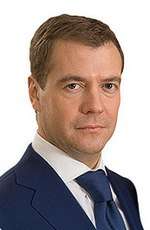United Russia
United Russia (Russian: Единая Россия, tr. Yedinaya Rossiya, IPA: [(j)ɪˈdʲinəjə rɐˈsʲijə]) is the ruling political party of Russia. United Russia is the largest party in Russia, and as of 2018 it holds 335 (or 74.44%) of the 450 seats in the State Duma. United Russia members have constituted the majority of State Duma since 2007.
United Russia Единая Россия | |
|---|---|
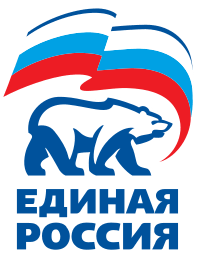 | |
| Chairman | Dmitry Medvedev |
| Secretary-General | Andrey Turchak |
| Parliamentary Leader | Sergey Neverov |
| Founders | Sergey Shoygu Yury Luzhkov Mintimer Shaimiev |
| Founded | 1 December 2001 |
| Merger of | Fatherland – All Russia Unity Our Home – Russia Agrarian Party |
| Headquarters | 39 Kutuzovsky Avenue Moscow, Russia 121170[1] |
| Youth wing | Young Guard of United Russia[2] |
| Membership (2013) | 2,073,772[3] |
| Ideology | Russian conservatism[4][5][6] Russian nationalism[7] Statism[8][9][10] |
| Political position | Big tent[11][a] |
| National affiliation | All-Russia People's Front |
| Colours | White, blue, red (Russian national colors) |
| Seats in the Federation Council | 128 / 170 [12] |
| Seats in the State Duma | 339 / 450 |
| Governors | 75 / 85 |
| Seats in the Regional Parliaments | 3,091 / 3,980 |
| Ministers | 20 / 31 |
| Website | |
| er | |
^ a: United Russia does not have a coherent ideology but has been described by various sources as centrist,[8][13] centre-right,[14] or right-wing.[15][16][17] | |
The United Russia party formed in December 2001 through a merger of the Unity and the Fatherland – All Russia parties. The United Russia party, along with A Just Russia party, supports the policy of Russian president Vladimir Putin, who is also de facto leader of the party.[18] Although the United Russia party's popularity declined from its peak of 64.4% in the 2007 Duma elections to 49.32% in the 2011 elections, it remained the most popular party in the country ahead of the second-placed Communist Party at 19.19%. In the 2016 elections, it received 54.2% while the second-place Communist Party received 13.3%.
The party has no coherent ideology, but it embraces specific politicians and officials[19] with a variety of political views who support the administration.[20] The party appeals mainly to non-ideological voters,[21] therefore United Russia is often classified by political scientists as a "catch-all party"[22][23][24] or as a "party of power".[25][26] In 2009, it proclaimed Russian conservatism as its official ideology.[4][5]
History
Origins
United Russia's predecessor was the Unity bloc, which was created three months before the December 1999 Duma elections to counter the advance of the Fatherland – All Russia (OVR) party led by Yuri Luzhkov. The creation of the party was heavily supported by Kremlin insiders, who were wary of what looked like a certain OVR victory. They did not expect Unity to have much chance of success since President Boris Yeltsin was very unpopular and Prime Minister Vladimir Putin's ratings were still minuscule. The new party attempted to mimic OVR's formula of success, placing an emphasis on competence and pragmatism. Charismatic Minister of Emergency Situations Sergei Shoigu was appointed as the party leader.[27]
In 1999, Prime Minister Putin's popularity soared to double-digit figures after he decisively sent troops to the rebellious Chechnya republic as a retaliation for bombings attributed to terrorists in Moscow and other cities and in response to the Chechen invasion of Dagestan. Putin's war effort was hugely popular and portrayed positively by the Boris Berezovsky-owned Channel One Russia as well as by state-controlled RTR.[28]
1999 State Duma election
Contrary to its creators' expectations, Unity's election campaign was a huge success and the party received 23.3% of the votes, considerably more than OVR's 13.3% and within one percentage point of the Communist Party's 24.3%.[27][28] The popularity of the prime minister proved decisive for Unity's victory.[28] The election results also made clear that Putin was going to win the 2000 presidential election, which resulted in competitors Luzhkov and Yevgeni Primakov dropping out. Yeltsin also gave Putin a boost by resigning as President on 31 December 1999.[27]
Creation of United Russia
While Unity had initially had only one narrow purpose, limited only to the 1999 Duma elections, after the victory state officials began to transform the party into a permanent one. A large number of independent deputies who had been elected to the Duma were invited to join the party's delegation. Many OVR deputies also joined, including its leader Luzhkov.[27] In April 2001, OVR and Unity leaders issued a joint declaration that they had started the process of unification. In July 2001, the unified party, called Union of Unity and Fatherland, held its founding congress and in December 2001 it became All-Russian Party of Unity and Fatherland, or more commonly, United Russia. In the second party congress in March 2003, Sergei Shoygu stood down and Boris Gryzlov was elected as the new party leader.[29]
Instead of the "communism versus capitalism" dichotomy that had dominated the political discourse in the 1990s, in the 1999–2000 electoral cycle Putin started to emphasize another reason to vote for his party: stability, which was yearned for by Russian citizens after a decade of chaotic revolutionary change. With the exception of the continued fighting in the Northern Caucasus, Putin was perceived to have delivered it.[28]
On 13 January 2003, United Russia had 257,000 members—behind Liberal Democratic Party of Russia (600,000) and the Communists (500,000).[29]
2003 State Duma elections
Throughout Putin's first years as president, the country's economy improved considerably, growing more each year than in all of the previous decade and Putin's approval ratings hovered well above 70%. Russia's economic recovery was helped by high prices for its primary exports such as oil, gas and raw materials.[28]
The passage rate of law proposals increased considerably after United Russia became the dominant party in the Duma. In 1996–1999, only 76% of the legislation that passed the third reading was signed by the President while in 1999–2003 the ratio was 93%. While Yeltsin had often relied on his decree powers to enact major decisions, Putin almost never had to. United Russia's dominance in the Duma enabled Putin to push through a wide range of fundamental reforms,[30] including a flat income tax of 13%, a reduced profits tax, an overhaul of the labour market, breakups of national monopolies and new land and legal codes.[30][31][32] United Russia characterised itself as wholly supportive of Putin's agenda, which proved a recipe for success and resulted in the party scoring a major victory in the 2003 Duma elections, receiving more than a third of the popular vote.[28]
Throughout its history, United Russia has been successful in using administrative resources to weaken its opponents. For example, state-controlled news media portrayed the Communist Party as hypocritical for accepting money from several "dollar millionaires" during the 2003 Duma election campaign.[27] United Russia also introduced tougher party, candidate and voter registration requirements and increased the election threshold from 5% to 7% for the 2007 elections.[28]
Opposition parties also made several strategic mistakes. For example, Yabloko and the Union of Right Forces seemed to spend more effort attacking each other than Putin, which made it easier for United Russia to win over liberal voters on the strength of market reforms under Putin.[27] The opposition parties faltered in the 2003 elections, with the Communists gaining just 52 seats, a drop from 113 in 1999. Liberal opponents fared even worse, with Yabloko and Union of the Right Forces failing to cross the 5 percent threshold.[28]
2007 State Duma elections
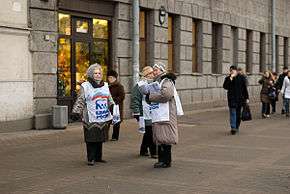
As the economy continued improving and Putin executed several popular moves, such as reining in the unpopular oligarchs, Putin's approval ratings stayed high and he won the 2004 presidential election with over 71% of the votes. The 2007 Duma elections proved a stunning victory for United Russia, which won 64.3% of the votes. The Communist Party became a distant second with 11.57% of the votes. Putin was the only name on United Russia's national list and his popularity helped the party to ensure victory.[28]
During the December 2007 election, the party was accused by voters and election monitoring group Golos of numerous election law violations banned in the Russian Constitution.[33]
The legislative agenda shifted somewhat after the 2007 elections. Anti-terrorism legislation, large increases in social spending and the creation of new state corporations became the dominant issues while less energy was devoted to economic reform.[30]
Medvedev/Putin: 2008–2012
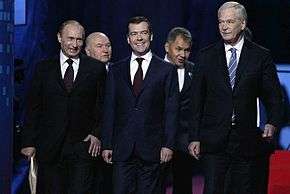
For the 2008 presidential election, United Russia nominated Dmitry Medvedev to succeed Putin. Medvedev received Putin's blessing and scored a clear victory, receiving 71% of the votes. As President, Medvedev nominated Putin as his Prime Minister. On 15 April of the same year, Putin accepted a nomination to become the party's leader, but declared that this did not mean he would become a member. Medvedev has also refused to become a member.[27]
During regional elections of 11 October 2009, United Russia won a majority of seats in almost every Russian municipality. Opposition candidates claim they were hindered from campaigning for the elections and some were denied places on the ballot.[34][35] There are also accusations of widespread ballot stuffing and voter intimidation as well as statistical analysis results supporting these accusations.[34]
Support for United Russia was 53% in a poll held in October 2009.[36] In 2010–2011 and following the economic crisis, support for United Russia went up and down, but declined overall. The share of the population ready to vote for the party reached its lowest point in January 2011 (35%) before recovering to 41% in March 2011.[37]
The Agrarian Party supported the candidacy of Dmitry Medvedev in the 2008 presidential election and it merged into United Russia.[38]
Putin/Medvedev: 2012–present

At the party's XII Congress held on 24 September 2011, Medvedev supported the candidacy of Prime Minister Putin in the presidential election of 2012—a move that effectively assured Putin would return to the presidency, given the party's near-total dominance of Russian politics. Medvedev accepted the invitation of Prime Minister Putin to head the party in the State Duma elections and said that in his opinion Putin should run for President in 2012.[39] Delegates applauded this statement standing and they unanimously supported his candidacy for President.[40] Medvedev responded immediately, saying that applause is proof of Putin's popularity among the people. Ten thousand participants of the meeting listened to Medvedev's speech. In total, the congress was attended by about 12,000 participants, guests and journalists.[41][42]
At the same congress, it was also approved by the election list of candidates from the party in the December elections to the State Duma. The list includes 416 party members and 183 non-partisan, 363 of them for the first time participate in the elections. On 29 September, the list was handed over to the Central Election Commission of the Russian Federation. The party-list was led by President Medvedev. 582 delegates of the Congress voted in support of the list, against one.[43][44]
_01.jpg)
The Election program of United Russia was announced during speeches of Medvedev and Putin. Medvedev has identified seven strategic priorities of government policy and Putin offered to cancel the erroneous tax debts of 36 million Russians in the amount of 30 billion rubles and increase from 10 October salaries of public sector employees by 6.5%. Putin also said that taxes for the wealthy citizens should be higher than for the middle class and offered to raise utility tariffs only excess baggage. Among other priorities, Putin called a complete re army and navy in 5–10 years, doubling the pace of road construction for 10 years, the creation or update of 25 million jobs in 20 years in and out of Russia in the five largest economies in the world.[45]
At the party's XIII Congress, held on 26 May 2012, Medvedev was elected chairman of United Russia.[46] United Russia decided not use portraits of President Medvedev and President Putin during the fall election campaign.[47]
In March 2013, about 50 members of the United Russia from Abansky District of Krasnoyarsk Krai announced their withdrawal from the party. They sent an open letter (said to have been signed by 60 people) to the party chairman Medvedev, which criticized the activities of the party which according to them has ceased to fulfil its political function.[48]
Electoral results
President
| Election year | Candidate | 1st round | 2nd round | ||
|---|---|---|---|---|---|
| No. of overall votes | % of overall vote | No. of overall votes | % of overall vote | ||
| 2004 | Vladimir Putin[lower-alpha 1] | 49,565,238 | 71.3 (won) | ||
| 2008 | Dmitry Medvedev | 52,530,712 | 71.2 (won) | ||
| 2012 | Vladimir Putin | 46,602,075 | 63.6 (won) | ||
| 2018 | Vladimir Putin[lower-alpha 1] | 56,430,712 | 76.7 (won) | ||
- Putin refused to be nominated by United Russia and ran as an independent.
State Duma
| Year | Party leader | Performance | Government | |||
|---|---|---|---|---|---|---|
| Votes | Percentage | Seats | ||||
| 2003 | Boris Gryzlov | 22,779,279 | 37.6% | 223 / 450 |
1st | Majority |
| 2007 | Boris Gryzlov | 44,714,241 | 64.3% | 315 / 450 |
1st | Supermajority |
| 2011[49] | Vladimir Putin | 32,448,000 | 49.3% | 238 / 450 |
1st | Majority |
| 2016 | Dmitry Medvedev | 28,271,600 | 54.2% | 343 / 450 |
1st | Supermajority |
Current status
Federal Assembly
_22.jpg)
United Russia currently holds 340 of the 450 seats in the State Duma.[28] It heads all five[50] of the Duma's commissions and holds 14[50] of the 26 committee chairmanships and 10[51] of the 16 seats in the Council of Duma, the Duma's steering committee. The speaker of the Duma is United Russia's Vyacheslav Volodin.[52][53]
The party has only informal influence in the upper house, the Federation Council, as the Council has rejected the use of political factions in decision making.[30]
Party platform
According to the party's 2003 political manifesto, The Path of National Success, the party's goal is to unite the responsible political forces of the country, aiming to minimize the differences between rich and poor, young and old, state, business and society. The economy should combine state regulation and market freedoms, with the benefits of further growth distributed for the most part to the less fortunate. The party rejects left-wing and right-wing ideologies in favour of "political centrism" that could unite all sections of society.[29] In addition, the official party platform emphasizes pragmatism and anti-radicalism. The party regards itself to be one of the heirs to Russia's tradition of statehood, both tsarist and communist.[54] United Russia's long-time moniker is "the party of real deeds".[55]
United Russia has always characterised itself as wholly supportive of the agenda of the popular current President Vladimir Putin and this has proved key to its success.
Since 2006, when Vladislav Surkov introduced the term sovereign democracy, many figureheads of the party have taken usage of the term. Former President and current Prime Minister Dmitry Medvedev has criticised the term. United Russia voted against the Council of Europe resolution 1481 (Need for international condemnation of crimes of communist governments).[56][57]
The party has promoted explicitly conservative policies in social, cultural and political matters, both at home and abroad. Putin has attacked globalism and economic liberalism as well as scientific and technological progress.[58][59] Putin has promoted new think tanks that bring together like-minded intellectuals and writers. For example, the Izborsky Club, founded in 2012 by Aleksandr Prokhanov, stresses Russian nationalism, the restoration of Russia's historical greatness and systematic opposition to liberal ideas and policies.[60] Vladislav Surkov, a senior government official, has been one of the key ideologists during Putin's presidency.[61]
In cultural and social affairs, United Russia has collaborated closely with the Russian Orthodox Church. Mark Woods provides specific examples of how the Church under Patriarch Kirill of Moscow has backed the expansion of Russian power into Crimea and eastern Ukraine.[62] More broadly, The New York Times reports in September 2016 how that Church's policy prescriptions support the Kremlin's appeal to social conservatives:
- A fervent foe of homosexuality and any attempt to put individual rights above those of family, community or nation, the Russian Orthodox Church helps project Russia as the natural ally of all those who pine for a more secure, illiberal world free from the tradition-crushing rush of globalization, multiculturalism and women’s and gay rights.[63]
Electorate
According to studies, United Russia voters in 2006 were younger and more market-oriented than the average voter. The party's electorate includes a substantial share of state employees, pensioners and military personnel who are dependent on the state for their livelihood.[55] Sixty-four percent of United Russia supporters are female. In the run-up to the 2011 Duma elections, it was reported that support for United Russia was growing among young people.[64]
Foreign opinions
Foreign media and observers describe United Russia as a pure "presidential party", with the main goal of securing the power of the Russian President in the Russian parliament. The vast majority of officeholders in Russia are members of the party, hence it is sometimes described as a "public official party" or "administration party". Due to this, it is also often labelled the "Party of Power".[65][66]
International alliances
United Russia has signed cooperation agreements with the right-wing Freedom Party of Austria,[67] Serbian Progressive Party,[68] the Cambodian People's Party,[69] the Japanese Liberal Democratic Party,[70] and the League of Italy.[71] Its youth wing, the Young Guard of United Russia, has an alliance with the youth wing of the right-wing populist Alternative for Germany, Young Alternative for Germany.[72] The party has also signed cooperation agreements with the Serb nationalist Alliance of Independent Social Democrats of Bosnia and Herzegovina and the Estonian Centre Party (though party leader Jüri Ratas recently claimed that the agreement has not been active for ten years and that there is no current cooperation between the parties).[73] The party has proposed a cooperation agreement to the populist Five Star Movement (M5S). The Five Star Movement never gave a proper answer to the proposal and it is currently unknown whether it actually accepted the proposal or not.[72]
United Russia has also signed cooperation agreements with Kazakhstan's Nur Otan party,[74] the Mongolian People's Party,[75] the Uzbekistan Liberal Democratic Party,[76] the People's Democratic Party of Tajikistan,[77] the Party of Socialists of the Republic of Moldova,[78] the Lao People's Revolutionary Party,[79] the Communist Party of Vietnam,[80] South Africa's African National Congress,[81] the New Azerbaijan Party,[82] the Prosperous Armenia party,[83] the Arab Socialist Ba'ath Party – Syria Region,[84] the Workers' Party of Korea,[85] the Communist Party of Cuba,[86] and the Philippines' PDP-Laban party.[87]
The party used to have an agreement with the Latvian Social Democratic Party "Harmony", but the agreement lapsed in 2016 and was not renewed.[73]
Structure
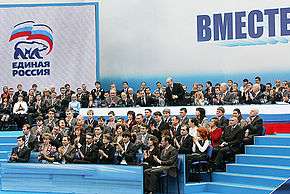
In April 2008, United Russia amended Section 7 of its charter, changing its heading from Party Chairman to Chairman of the Party and Chairman of the Party's Supreme Council. Under the amendments, United Russia may introduce a supreme elective post in the party, the post of the party's chairman, at the suggestion of Supreme Council and its chairman.
The Supreme Council, led by the Supreme Council chairman, defines the strategy for the development of the party.
The General Council has 152 members, is the foremost party platform in between party congresses and issues statements on important social or political questions. The Presidium of the General Council is led by a secretary, consists of 23 members and leads the political activity of the party, for instance election campaigns or other programmatic publications.
United Russia introduced a local chapter system that mimicked the Japanese Liberal Democratic Party's (LDP) organization as a strong foundation for the one-party dominant system in the early 2000s. United Russia eagerly interviewed the LDP mission and studied their party structure. The number of party members was steadily increased by the introduction of the system.[88]
United Russia runs local and regional offices in all parts of the Russian Federation and also operates a foreign liaison office in Israel through a deal with the Kadima party.[89]
As of 20 September 2005, the party has a total of 2,600 local and 29,856 primary offices.
Internal groupings
United Russia is a large and diverse party and has several internal subdivisions. The party has 4 internal groupings, organized around common policy interests. In addition, the party makes use of four internal political clubs to debate policy: liberal conservative 4 November Club, social conservative Centre for Social Conservative Politics, conservative liberal State Patriotic Club and liberal Liberal Club.[30] Based on this division, the party considered entering the 2007 Duma elections as three separate "columns" (liberal, conservative and social), but the idea was subsequently abandoned.
Chairmen of United Russia
| № | Chairmen | Portrait | Took Office | Left Office | ||||||
|---|---|---|---|---|---|---|---|---|---|---|
| — | Collective leadership
|
1 December 2001 | 27 November 2004 | |||||||
| 1 | Boris Gryzlov | 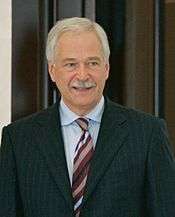 |
27 November 2004 | 7 May 2008 | ||||||
| 2 | Vladimir Putin[90][91] |  |
7 May 2008 | 30 May 2012 | ||||||
| 3 | Dmitry Medvedev[92] | 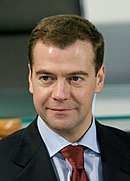 |
30 May 2012 | Incumbent | ||||||
Allegations of crime and corruption
.jpg)
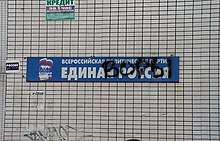
United Russia has come in for criticism that it is "the party of crooks and thieves" (партия жуликов и воров, a term coined by activist Alexey Navalny)[93] due to the continuing prevalence of corruption in Russia.[94] In October 2011, Novaya Gazeta published an article describing how members of the public were writing the slogan on banknotes in protest.[95] In December 2011, Putin rejected the accusation of corruption, saying that it was a general problem that was not restricted to one particular party: "They say that the ruling party is associated with theft, with corruption, but it's a cliché related not to a certain political force, it's a cliché related to power [...] What's important, however, is how the ruling government is fighting these negative things".[94]
A poll made in November 2011 found that more than one-third of Russians agreed with the characterisation of United Russia as "the party of crooks and thieves".[96]
After the 2011 legislative elections, a few leaders within United Russia called for investigations of fraud and reform of the party.[97]
Notable members
- Vladimir Putin, President of Russia and former chairman of the party
- Boris Gryzlov, former Interior Minister and Chairman of the Supreme Council of the United Russia and former leader of the party
- Vyacheslav Volodin, current Chairman of the State Duma
- Valentina Matviyenko, current Chairwoman of the Federation Council
- Sergey Shoygu, current Defence Minister, former Emergency Minister, former leader of Unity party and former leader of the party
- Mintimer Shaymiev, President of Tatarstan until 2010
- Vladislav Surkov, First Deputy Chief of Staff of the President
- Alexander Zhukov, First Vice Chairman of the State Duma and former Deputy Prime Minister
- Dmitry Medvedev, chairman of the party, Prime Minister of Russia, former President of Russia and the leader of the party's Federal list to the Duma (since 24 September 2011)
See also
- Belaya Rus
- For United Ukraine, a political alliance created two weeks later in Ukraine and led by the Party of Regions
- Russian Unity
- Serbian Progressive Party
- Unity Party (South Ossetia)
References
- "Единая Россия официальный сайт Партии / Пресс-служба / Контакты". er.ru.
- "Rechtspopulisten - AfD-Jugend und Putin-Jugend verbünden sich" [Right-wing populists - AfD youth and Putin youth join forces]. Spiegel Online (in German). 23 April 2016. Retrieved 24 December 2017.
- ИНФОРМАЦИЯ о численности членов Всероссийской политической партии "ЕДИНАЯ РОССИЯ" в каждом из ее региональных отделений (по состоянию на 1 января 2011 года) [Information on the number of members of the political party "UNITED RUSSIA" in each of its regional offices (as at 1 January 2011)] (in Russian). minjust.ru. 1 February 2011. Archived from the original (DOC) on 25 October 2012. Retrieved 30 March 2015.
- Mezhuev, Boris V. (2013). Democracy in Russia: Problems of Legitimacy. Power and Legitimacy—Challenges from Russia. Routledge. p. 115.
- White, Stephen (2011). Understanding Russian Politics. Cambridge University Press. p. 362.
- "В Кремле рассказали о правом сдвиге "Единой России"" [The Kremlin talks about the right shift of "United Russia"] (in Russian). RBK Group. Retrieved 25 December 2017.
- Laruelle, Marlène (2009). "Nationalism as Conservative Centrism: United Russia". In the Name of the Nation. New York: Palgrave Macmillan. pp. 119–152. doi:10.1057/9780230101234_5. ISBN 978-1-349-38117-3.
- Nordsieck, Wolfram (2016). "Russia". Parties and Elections in Europe. Retrieved 20 August 2018.
- Sakwa, Richard (2013). Power and Policy in Putin's Russia. Routledge. p. 7. ISBN 978-1-317-98994-3. Retrieved 14 October 2017.
- de Vogel, Sasha (25 October 2012). "New Russian "Patriots"". The Institute of Modern Russia. Retrieved 26 May 2017.
- Chen, Cheng (2016). The Return of Ideology: The Search for Regime Identities in Postcommunist Russia and China. University of Michigan Press. p. 87. ISBN 978-0-472-11993-6. Retrieved 30 October 2017.
- "Единая Россия официальный сайт Партии / Кто есть кто / Члены Совета Федерации РФ - члены партии "Единая Россия"". er.ru.
- White, Stephen (2012). Graeme Gill; James Young (eds.). Public opinion and voting behaviour. Routledge Handbook of Russian Politics and Society. Routledge. p. 359.,
- Coalson, Robert (5 September 2007). "Russia: Kremlin Labors To Get "A Just Russia" Into The Next Duma". Radio Free Europe/Radio Liberty.
- Gönen, Selim (17 January 2020). "Uncertainty looms as Putin carves the future of troubled Russia". Daily Sabah.
Meanwhile, the State Duma, the lower house of the Federal Assembly of Russia, is currently dominated by members of the current ruling right-wing political party United Russia.
- Borisov, Sergey (23 November 2009). "United Russia 'determined itself as a right-wing party'". RT. Archived from the original on 29 July 2017. Retrieved 27 March 2018.
Having called themselves "conservatives," the members of United Russia "have simply determined their place" as a right-wing party, political scientist Dmitry Travin said. That means that they are "politicians who defend values of the market economy based on national traditions," Rosbalt news agency quoted him as saying.
- Paulo Vicente Alves (2014). Emerging Markets Report (1st ed.). AVEC Editora. ISBN 9788567901053. Retrieved 27 March 2018.
Here are the two main parties, the "Right-Wing" United Russia and the "Statist" CPRF (Communist Party). United Russia was created in 2001 from the union of the Unity and Fatherland parties. Their "Right-Wing" position in the frontier of "Leftist" groups shows how hard it is to define United Russia but it is definitely trying to move Russia toward capitalism with stability.
- "Песков: Путин – лидер "Единой России"". Телеканал «Красная Линия».
- Roberts, S. P. (2012). Putin's United Russia Party. Routledge Series on Russian and East European Studies. Routledge. p. 189. ISBN 9781136588334.
- Way, Lucan (2010), "Resistance to Contagion: Sources of Authoritarian Stability in the Former Soviet Union", Democracy and Authoritarianism in the Postcommunist World, Cambridge University Press, pp. 246–247
- Hutcheson, Derek S. (2010). Political marketing techniques in Russia. Global Political Marketing. Routledge. p. 225.
- Sakwa, Richard (2011). The Crisis of Russian Democracy: The Dual State, Factionalism and the Medvedev Succession. Cambridge University Press. pp. 217–218.
- Bodrunova, Svetlana S.; Litvinenko, Anna A. (2013). New media and political protest: The formation of a public counter-sphere in Russia, 2008–12. Russia's Changing Economic and Political Regimes: The Putin years and afterwards. Routledge. pp. 29–65, at p. 35.
- Rose, Richard (2009). Understanding Post-Communist Transformation: A bottom up approach. Routledge. p. 131.
- Compare: Remington, Thomas (2013). Patronage and the Party of Power: President—Parliament Relations under Vladimir Putin. Power and Policy in Putin's Russia. Routledge. p. 106. ISBN 9781317989943. Retrieved 22 August 2016.
The party of power in Russia has not achieved [..] single-minded mastery of the power and wealth associated with the control of patronage. The party is united only in its support for and dependence on the Kremlin; it is divided when its principal clients take opposing sides. [...] United Russia is not a programmatic party, but a mechanism for extracting rents and distributing patronage. [...] In Russia, the party is the creature of the presidency. [...] [T]he construction of a lasting party of power such as united Russia requires a sustained commitment on the part of the authorities, one which president Putin has been willing to undertake. [...] [T]he concerted effort by President Putin's administration to build up a lasting party of power is a significant development in post-1993 Russian politics [...].
- Moraski, Bryon J. (2013). The Duma's electoral system: Lessons in endogeneity. Routledge Handbook of Russian Politics and Society. Routledge. p. 109. ISBN 9781136641022. Retrieved 22 August 2016.
With the March 2000 election of President Vladimir Putin, [...] the suspicion was that [...] institutional changes 'could resurrect a system dominated by a single "party of power"' (McFaul 2000, 30). [...] Still, Russia's electoral system remained largely unchanged for the 2003 Duma election, although the results certainly fuelled speculation that a dominant-party-state had begun to emerge. [...] With the union of Fatherland-All Russia and Unity, Russia's party of power had changed once again, this time emerging as United Russia. The 2003 Duma election provided some evidence that the electoral system was working in the party of power's favour.
- Hale, Henry E. (2010). "Russia's political parties and their substitutes". In White, Stephen (ed.). Developments in Russian Politics 7. New York: Palgrave Macmillan. ISBN 978-0-230-22449-0.
- McFaul, Michael; Stoner-Weiss, Kathryn (2010). "Elections and Voters". In White, Stephen (ed.). Developments in Russian Politics 7. New York: Palgrave Macmillan. ISBN 978-0-230-22449-0.
- White, Stephen (2005). "The Political Parties". In White; Gitelman; Sakwa (eds.). Developments in Russian Politics. 6. Duke University Press. ISBN 978-0-8223-3522-1.
- Remington, Thomas F. (2010). "Parliamentary Politics in Russia". In White, Stephen (ed.). Developments in Russian Politics 7. New York: Palgrave Macmillan. ISBN 978-0-230-22449-0.
- "The Putin Paradox". Americanprogress.org. 24 June 2004. Archived from the original on 8 August 2007. Retrieved 2 March 2010.
- Sharlet, Robert (2005). "In Search of the Rule of Law". In White; Gitelman; Sakwa (eds.). Developments in Russian Politics. 6. Duke University Press. ISBN 978-0-8223-3522-1.
- "Russians complain of being pressured to vote". International Herald Tribune. Associated Press. 2 December 2007. Archived from the original on 8 February 2008. Retrieved 13 April 2010.
- "Medvedev hails, opponents decry Kremlin party win" (12 October 2009). Reuters.
- "Pro-Kremlin party sweeps Moscow elections" (12 October 2009). Associated Press.
- "Poll ratings of Russia's Putin, Medvedev tumble". Kyiv Post. Reuters. 2 November 2009. Archived from the original on 7 January 2010.
- "Voting Behaviour – Duma". Levada.
- "Russia's Agrarian Party to merge with United Russia". Xinhuanet. China View. Retrieved 19 December 2014.
- Путин уверен в победе 'Единой России' [Putin is confident of victory for 'United Russia']. inotv.rt.com (in Russian). 24 September 2011. Archived from the original on 27 September 2013.
- "Medvedev vozglavit spisok Edinoj-Rossii". Archived 27 September 2013 at the Wayback Machine
- Медведев рекомендовал Путина в президенты (in Russian). Archived from the original on 29 September 2013.
- Народ к возврату готов (in Russian). Archived from the original on 12 August 2015. Retrieved 8 May 2016.
- Единая Россия официальный сайт партии / Новости / "Единая Россия" подала в ЦИК РФ список народных кандидатов в Госдуму (in Russian). Retrieved 8 May 2016.
- Д. Медведев единолично возглавил федеральный список "ЕР". РБК (in Russian). Retrieved 8 May 2016.
- Речи Медведева и Путина стали предвыборной программой "Единой России" (in Russian). Retrieved 8 May 2016.
- Дмитрий Медведев избран председателем «Единой России», 26 May 2012, Vesti.ru
- "Единая Россия" откажется от портретов Путина и Медведева (in Russian). Retrieved 8 May 2016.
- Полсотни красноярских единоросов вышли из партии (in Russian). Retrieved 8 May 2016.
- "United Russia to have 238 seats at new State Duma" (6 December 2011). itar-tass.com.
- Комитеты и комиссии Государственной Думы. duma.gov.ru (in Russian). Retrieved 21 December 2017.
- Состав Совета Государственной Думы. duma.gov.ru (in Russian). Archived from the original on 15 May 2017. Retrieved 21 December 2017.
- "Russian Justice Ministry Warns RFE/RL As Duma Passes New Media Restrictions". RadioFreeEurope/RadioLiberty. Retrieved 21 December 2017.
- Володин Вячеслав Викторович. duma.gov.ru (in Russian). Retrieved 21 December 2017.
- Morozov, Oleg (15 April 2006). Центризм – это антирадикализм [Centrism – is anti-radicalism]. United Russia Official Site (in Russian). Archived from the original on 19 October 2007. Retrieved 8 May 2016.
- Reuter, Ora John (26 November 2011). "United Russia and the 2011 Elections" (PDF). Russia Analytical Digest (102): 2–6. ISSN 1863-0421. Archived from the original (PDF) on 24 March 2016. Retrieved 1 April 2006.
- The information from the Encyclopedia of communism (English translation).
- The Council of Europe resolution 1481 (official text).
- Goble, Paul A. (20 January 2015). "Alfred Koch: Putin's rejection of science and fear of the educated destroying Russia's future". Euromaidan Press. Retrieved 13 June 2017.
- Sergei Prozorov. "Russian conservatism in the Putin presidency: The dispersion of a hegemonic discourse". Journal of Political Ideologies 10.2 (2005): 121–143.
- Marlene Laruelle. "The Izborsky Club, or the New Conservative Avant‐Garde in Russia". Russian Review 75.4 (2016): 626–644.
- Sirke Mäkinen. "Surkovian narrative on the future of Russia: making Russia a world leader". Journal of Communist Studies and Transition Politics 27#2 (2011): 143–165.
- Mark Woods. "How the Russian Orthodox Church is backing Vladimir Putin's new world order" (3 March 2016). Christian Today.
- Andrew Higgins. "In Expanding Russian Influence, Faith Combines With Firepower" (13 September 2016). The New York Times.
- Yevgeny Utkin. "Seven parties, one virtually certain outcome" (23 November 2011). Russia Beyond the Headlines.
- "Putin's 'Party of Power' and the Declining Power of Parties in Russia" Archived 21 October 2011 at the Wayback Machine (April 2005). The Foreign Policy Centre.
- "What is Russian party of power?" (14 June 2005). RIA Novosti.
- Smale, Alison. "Austria's Far Right Signs a Cooperation Pact With Putin's Party". The New York Times. Retrieved 6 March 2017.
- "POTPISANA ZAJEDNIČKA IZJAVA: Produbiti strateško partnerstvo Srpske napredne stranke i Jedinstvene Rusije" (in Serbian). Kurir. 18 March 2019. Retrieved 19 March 2019.
- "Putin's party, CPP 'peas in pod'". The Phnom Penh Post. 20 November 2015.
- "Comment by the Information and Press Department on the third round of 2+2 foreign and defence ministerial talks". MFA of Russia. 30 July 2018.
- ЕР заключила договор о взаимодействии с итальянской партией "Лига Севера" (in Russian). RIA. Retrieved 6 March 2017.
- Rettman, Andrew (7 March 2017). "Moscow 'ready' to sign pact with Italy's Grillo". Brussels: Euobserver.com. Retrieved 29 October 2017.
- ERR (9 October 2017). "Ratas: Center Party not planning to give up protocol with United Russia". ERR. Retrieved 8 February 2020.
- ""Nur Otan" and "United Russia" signed a cooperation agreement". Kazakhstanskaya Pravda. 25 June 2015.
- "Speaker of Mongolian Parliament continues visit in Russia". MONTSAME News Agency.
- "UzA - Uzbekistan and Russia's leading parties sign a Cooperation Agreement". uza.uz.
- "Tajik, Russian ruling parties sign cooperation agreement | Tajikistan News ASIA-Plus". asiaplustj.info.
- "Party of Socialists of Moldova and the Party "United Russia" will sign an agreement on cooperation » Accent TV". a-tv.md.
- "Dmitry Medvedev meets with President of Laos Bounnhang Vorachith". government.ru.
- "Party chief meets ruling United Russia Party leader | Politics | Vietnam+ (VietnamPlus)". en.vietnamplus.vn.
- "Putin and South Africa's ANC: Friends in troubled times? - South African Monitor - 13 October 2016 - South African Monitor". sa-monitor.com.
- https://azertag.az/en/xeber/YAP_EDINAYA_ROSSIA_SIGN_COOPERATION_AGREEMENT-569357
- ""Единая Россия" подписала Протокол о сотрудничестве с "Процветающей Арменией"". er.ru. 26 February 2019.
- "Delegation from ruling Syrian Baath Party arrives in Moscow: Russian Lawmaker".
- "United Russia and Workers' Party of Korea to meet in Moscow in late May". TASS.
- Latina, Taken from Prensa. "Russia, Cuba Sign Party Cooperation Agreement". www.cmhw.cu.
- "After China, PDP-Laban signs deal with Putin's United Russia party". Rappler. 18 October 2017.
- 武部幹事長が「統一ロシア」の訪日団と会談]」 (in Japanese). 1 November 2004. Archived from the original on 9 December 2004.
- "Russian PM Putin to open official party branch in Israel". Haaretz. Israel. Retrieved 13 April 2010.
- "Putin to lead United Russia party" (15 April 2008). BBC News. Retrieved on 6 December 2011.
- "Putin Named Party Chairman". Archived 22 December 2011 at the Wayback Machine. The Moscow News (17 April 2008). Retrieved on 6 December 2011.
- "Russia PM Medvedev set to be elected United Russia leader" (26 May 2012). BBC. Retrieved on 1 June 2012.
- "Medvedev 'tweet' sends the Russian blogosphere into a frenzy". The Guardian. 7 December 2011.
- "Police and protesters clash in Moscow after election protests". The Daily Telegraph. 6 December 2011.
- "«Жулики и воры» пошли по рукам" (12 October 2011). Novaya Gazeta.
- "Putin Faces Push to Regain Support After Election". The Wall Street Journal. 6 December 2011. Retrieved 10 December 2011.
- Schwirtz, Michael (28 December 2011). "An Insider Takes a Public Stand Against Putin's Party". The New York Times. Retrieved 28 December 2011.
Further reading
- Hale, Henry E. (2004). "The Origins of United Russia and the Putin Presidency: The Role of Contingency in Party-System Development" (PDF). Demokratizatsiya. 12 (2): 169–194.
- Jeffries, Ian (2011). Political Developments in Contemporary Russia. Routledge. ISBN 9781136849657.
- Laruelle, Marlène (2009). "Nationalism as Conservative Centrism: United Russia". In the Name of the Nation: Nationalism and Politics in Contemporary Russia. Palgrave Macmillan. pp. 119–152. ISBN 9780230618602.
- White, Stephen (2013). Russia's Client Party System. Politics In Russia: A Reader. CQ Press. doi:10.1093/acprof:oso/9780199289653.001.0001. ISBN 9780199289653.
External links
| Wikimedia Commons has media related to United Russia. |
- Official website of United Russia (in Russian)
- Official website of the Duma fraction (in Russian)
- Youth wing of the party (in Russian)
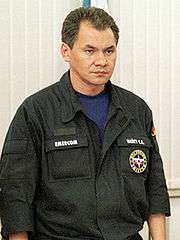

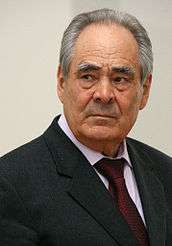
.jpg)
